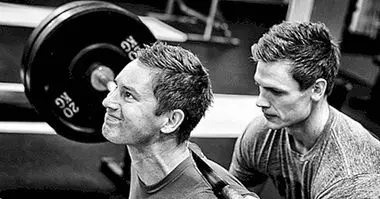The 10 psychological benefits of practicing physical exercise
Many people join the gym to improve their cardiovascular health, to gain muscle or to have a movie body. However, there are other positive effects that we can achieve with the practice of regular physical activity, such as psychological benefits .
Psychological benefits when doing sports: practicing exercise is healthy for your mind!
During the last decades, researchers have been discovering how to practice Exercise can improve our cognitive functions , and regardless of age or physical condition, studies have shown that dedicating time to exercise also it produces many benefits for our mental well-being . "Exercising regularly is good for humor, memory or learning," explains psychiatrist John Ratey of Harvard Medical School, author of the book.The New and Revolutionary Science of Exercise and the Brain ".
If you get used to practicing daily or if you are one of those who have trouble putting on your tracksuit, pay attention to the following lines. Next, from Psychology and Mind , we present the 10 psychological benefits of practicing exercise.
1. Produces happiness chemistries
Running a few kilometers can be hard, But it's worth it! Exercise favors the release of endorphins , chemical substances that produce a feeling of happiness and euphoria.
Studies have shown that they can even relieve symptoms of depression. For this reason, psychologists recommend that people suffering from depression or anxiety improve their quality of life including exercise in their lives. If you are not one of those people who practice physical activity every day, with practicing 3 days a week for half an hour you can improve your mood instantly.
2. Reduce stress
After a hard day of work, there is nothing better than going to disconnect playing paddle tennis, stepping into the gym or running on the beach. One of the psychological benefits of practicing physical activity is that it reduces stress.
In addition, the exercise also increases the production of norepinephrine (noradrenaline), a chemical that can moderate the brain's response to stress. So put on your sports clothes and sweat a little bit, that exercise improves our body's ability to deal with the tension that stress produces after so much office and so many day-to-day worries.
3. Improves self-esteem
Seeing yourself better physically will make you feel good. The continuous exercise will improve the image of yourself and improve your self-esteem. Regardless of weight, age or sex, physical exercise can elevate the positive perception of attractiveness of oneself, and consequently, make you value more.
4. Improve your social relationships
As the perception of yourself and your emotional health improve, your social relationships can also improve . Due to your increased self-confidence you will have more possibilities to reach others, and if you participate in directed classes or perform group sports, it is expected that you will meet new people.
5. Relieve anxiety
The neurotransmitters released during and after exercise can help people who suffer from anxiety to calm down. A bicycle ride or some aerobic exercise of medium or high intensity, can reduce the symptoms that the anxiety produces. Sport and exercise, therefore, not only serve to burn fat or gain muscle.
6. Prevents cognitive deterioration
As we get older, the risk of suffering increases degenerative diseases like Alzheimer's, especially from 45 years old. Performing physical activity mainly between 25 and 45 years it is possible to increase the chemicals in the brain that prevent the degeneration of hippocampal neurons.
In addition, practicing physical exercise on a regular basis and adapting the requirement for the elderly is associated with a lower risk of mortality. Mainly, as a consequence of a cardiovascular protective effect, physical activity decreases the risk of suffering a cerebral stroke and improves cognitive function by reducing the risk of suffering from dementia and Alzheimer's.
7. Improve your memory
Practicing exercise regularly improves your memory and the ability to learn new things, as it increases the production of hippocampal cells that are responsible for memory and learning. Research in this field positively relates the brain development of children with the physical condition of them.
This not only happens in the case of minors, the elderly can also improve their training memory. A study of Winter and Breitenstein (2007), demonstrated that performing sprints improves the acquisition and retention of vocabulary in adults.
8. Increase your brain capacity
By exercising your brain produces more neurons and more connections between them, a phenomenon known as neurogenesis. Therefore, your brain will gain shape and your learning capacity will increase.
In an investigation of Vaynman, Ying and Gomez-Pinilla , showed that intense training increases the levels of a protein known as BDNF (Brain Derived Neurotrophic Factor) that is found in the brain, and that is believed to have a positive influence on decision making, thinking and learning. To deepen this topic, we recommend that you read the article "5 tricks to improve your intelligence", from the psychologist Bertrand Regader .
9. It helps you be more productive
An investigation of Schwarz and Hasson (2011) concluded that workers who practice exercise or sports regularly are more productive and they have more energy than their sedentary partners.
In addition, if we go to practice sports at noon, in the lunch break, or before going to work, the activity will help us to stay more active throughout the day, avoiding moments of slump or lack of attention in the work.
10. Help control addiction
The brain releases dopamine (the reward neurotransmitter) in response to a pleasurable stimulus such as sex, drugs or foods. Unfortunately, there are people who become addicted and dependent on the substances that produce their release in large quantities. The practice of exercise can help in the recovery of the addict, because short sessions of exercise have a positive effect on addicts to alcohol or drugs by postponing "carving" (at least in the short term).
The abuse of alcohol also prevents normalcy in the life of the addict. A negative consequence of the excessive consumption of this substance is that interrupts circadian rhythms , and as a result, alcoholics have difficulty sleeping or staying asleep if they do not consume alcohol. Exercising can help restart the biological clock and helps you fall asleep.
Concluding
In summary, physical exercise is natural, it is easy, it helps you to improve the quality of life, increases your self-esteem, prevents diseases and improves your learning. After reading this, Are you still going to want to give up these benefits?
The companions of the Technological University of Ecuador They have made a video in which they explain to you in an audiovisual way the psychological benefits of practicing physical exercise. Take a look at it:



















